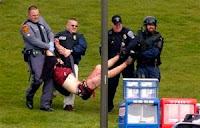 Our local newspaper posted the infamous picture of a victim of the Virginia Tech shooting on its cover page last week (picture credit: ALAN KIM/THE ROANOKE TIMES) and that created an expected uproar. Many thought it too graphic and inappropriate while others thought that it reflected the horrific realities of the carnage.
Our local newspaper posted the infamous picture of a victim of the Virginia Tech shooting on its cover page last week (picture credit: ALAN KIM/THE ROANOKE TIMES) and that created an expected uproar. Many thought it too graphic and inappropriate while others thought that it reflected the horrific realities of the carnage.While the subplot to this was the perception among some who were offended that the picture showed the victim's genitals (I wonder what they'd see in Rohrschach ink blots), I'm going to focus on an interesting sideline in a commentary by a journalism professor. While holding up the cover page, he asked his journalism class what they thought and whether they would have published the picture. As expected the reaction was mixed - some people saying yes and others saying no. The argument in favor was that the picture instantly told the horrific story of what had happened and drove home the impact of the shootings.
To me, the fascinating follow up question was that when they were asked if they would change their mind if the killings had happened locally, the almost unanimous answer was that if this had been a local killing, they certainly would not have run the graphic picture of "one of their own" being dragged, bleeding out of harm's way. Why? Why is it okay to show a graphic image of a killing that happened a few thousand miles away and not okay to show a similar image of a local shooting?
The anonymity afforded by the geographic distance of Virginia also affords all of us a psychological distance that lessens the emotional impact of anything that goes on. That is why most of us can so easily handle graphic killings of people as long as it is happening on a different continent many miles away from home. This simple psychological self-protection scheme helps us better handle life. If every death or every killing that happens in the world had the same psychological impact on us as the killing of a neighbor, we would soon be unable to function. At some point, though, we must pause to think that each person killed is someone's neighbor, father, mother, sister, child ...
In Stanley Milgram's famous experiment on obedience, he found that as the "victim" of the shocks were made more immediate to the "teacher," (by bringing him physically closer), the likelihood of continuing the shocks dropped dramatically. People were much more willing to hurt someone (to the point of killing them) if the victim was more physically (and thereby psychologically) distanced from the subject. The implications are chilling -- you are less likely to feel the pain and suffering of other people who are far away and so you are less likely to react and do anything about it. In fact, you may even take active efforts to support killing as long as the impact of that killing was not immediate.
I once had a conversation with someone about the 9/11 tragedy. He said that we ought to just go after all these terrorists and just kill them one by one with no questions asked. He said that our civil liberties are constraining us to the point of protecting cold-blooded killers who hide behind these protections. When we moved to "collateral damage" and the danger that a few innocents may be killed if we sent squads after terrorists with no oversight, he shrugged and said it was just the cost and the benefits would far outweigh the loss of a few innocent lives. That sent a little chill down my spine. While I'm sure he wouldn't feel the same way if I was the one being led away because of some innocent misunderstanding, I know that millions of others who don't know me would simply shrug their shoulders and write it off as a small price to pay for getting quickly at a large number of evil people.
This is not an anti-war statement. As mentioned earlier, we can't start feeling the emotional impact of every death. This is just a normal psychological defense mechanism to help us get through life feeling relatively good. It's just that the implications of this normal reaction are scary. Your normal psychological effort to feel good about yourself could lead to few people rushing to my defense if I'm falsely accused of being a terrorist.
Hope you feel better about yourself!
No comments:
Post a Comment